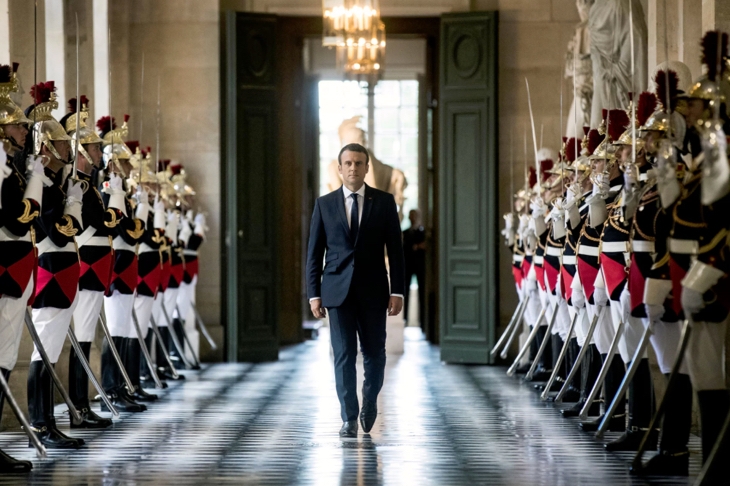Have the French belatedly realised the error of their regicide and decided to restore the monarchy? If so, will the regime of Emmanuel Macron, whose seizure of power must certainly be inspiring politicians around the globe with its brutal efficacy, end the same way? Macron’s glittering and symbolic appearance yesterday at the Palace of Versailles to address a joint session of the National Assembly – over which he currently exercises complete domination – and the Senate, will give historians, semioticians and journalists plenty to mull (although Macron has said that his thoughts are too complex to be explained to the media). But Macron played a blinder. Many French deeply regret not having a king. Now, at least for the next five years, they seem to have one.
In a state of the republic speech lasting an hour and a half, Macron bewitched, seduced and confused. He sketched in the broadest possible terms the simultaneous objectives of a profound reform of French political institutions, an unblocking of the sclerotic French economy, a restoration of the European Union (with France at its centre), and above all, the rehabilitation of the glory of France, with himself at the centre.
This morning, at Marie-Trinité’s cafe in our village, and later in phone calls to a friend who is an opposition deputy, and several others on my go-to list of astute political observers, I consulted my usual focus group and found, to my surprise, a reaction generally much less hostile than I’d anticipated, although not universally so. ‘I think we must give him a chance,’ said Catherine, a Républican who voted against Macron but who now believes that perhaps, after all, he will deliver the reforms she wants. Benoît, an unabashed supporter of the National Front, muttered of there having been something resembling a coup d’état, executed by means of a perverse electoral system that saw Macron come to power with the support of the media, the bankers and much of the political establishment, although with the backing of fewer than 20 percent of the electorate. Jacques, a hard-leftist, was reduced to quoting Le Guépard: ‘Il faut que tout change pour que rien ne change.’
https://www.youtube.com/watch?v=GawD_EkLuzY
But if most seemed at best impressed by his audacity and regal pretensions, they confessed to being unable to grasp the full implications of his discourse. And it’s hard not to have been impressed, if not cowed by the absolute bravado of the young president, an improbable macedoine of the narcissism of Donald Trump, the arrogance of Charles De Gaulle and the subtlety of Barack Obama.
In the search for metaphors to describe what is happening in France, there is plenty of choice. The obvious one is the comparison with Jupiter, king of the gods. Others include Louis XIV, the Sun King, with his affection for gilded pomp; Napoleon Bonaparte, with his aspiration to conquer Europe; Fidel Castro, who also loved to talk for a long time, uninterrupted, and even Julien Sorel, the protagonist of Stendhal’s Le Rouge et le Noir, the story of a young man from the provinces whose ascent in French society is ultimately undone by hypocrisy and deception. Bizarrely, in Macron’s new official portrait, a copy of this book lies open on the desk behind him – along with two iPhones and a clock – representing Macron’s claim to be the master of time.
I confess that I have in this space severely underestimated Macron, considering him a pawn or marionette of the French deep state. In my defence, I was not alone. Yet defying the scepticism of journalists like me, his triumph seems to have been absolute.
Boualem Sansal, the brilliant Algerian novelist, writes of France’s ‘altered state’ in which oligarchs mobilised the state, the government, the law, the media, artists, pollsters and civil society leaders to carry Macron to power, an ‘unconquerable hero’. A system ‘no longer quite a democracy, not a dictatorship either, it doesn’t yet have a name. An acronym or composite made up of “democracy,” “dictatorship” and “plutocracy” would do the trick nicely.’
Is this it, or is it possible that having achieved his victories in both the presidential election and the National Assembly elections that followed, Macron may have outsmarted all of us, including his shadowy backers.
We must now wait for the speech of Edouard Philippe, Macron’s prime minister, for the meat on the bones of the Macron project, but it is not necessary to wait for many sceptics to detect sinister elements. Macron may claim to be a centrist, but his elitist, authoritarian instincts are hardly concealed. He intends to use his overwhelming majority in the National Assembly to pass legislation delegating the power to impose reforms to a series of special commissions. He has promised to end the state of emergency in France, but at the same time to incorporate many of its most repressive features into the ordinary law.
France, and those of us who love it, has for many years yearned for a leader with the courage and vision to rescue the nation from the culture of decline that has seen young people consigned to tossing burgers, France’s minority populations ghettoised, terrorism unchecked and unions running amok while hundreds of thousands of the best and brightest flee to Britain and beyond in search of opportunities denied to them at home. Macronisme may or may not be the vehicle that can deliver these changes, but at what cost to liberty, equality and fraternity? Be careful what you wish for.
Jonathan Miller is a municipal councillor in the south of France and author of France, a Nation on the Verge of a Nervous Breakdown. He is on Twitter @lefoudubaron







Comments